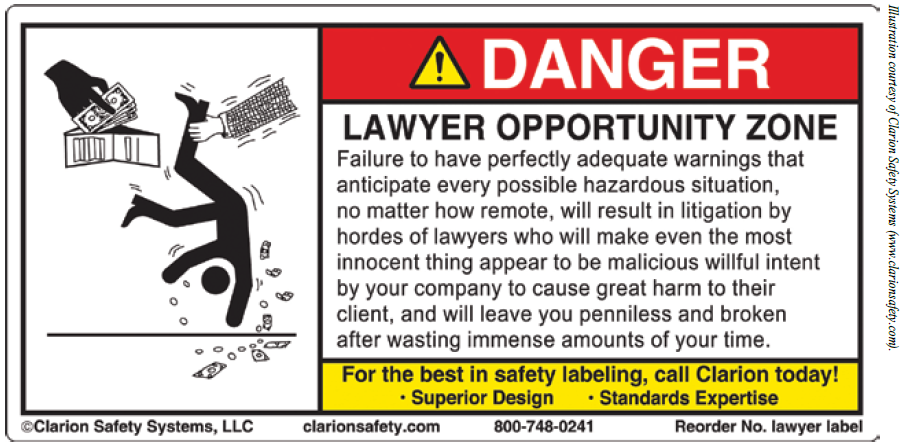Industry leaders must vigorously rebut the doubters, anti-regulation folks, and the less-professional installers who dismiss the importance of complying with UL 325. These people sometimes say, “It’s not a law,” but they are misinformed. Armed with the following data, leaders can challenge this dangerous attitude of dismissing the importance of the UL 325 standard.

The full name of the standard is ANSI/CAN/UL 325:2017, and the current version is the 7th edition. This means that this standard is much more developed and recognized than the thousands of minor standards that exist in the United States. DASMA Technical Data Sheet (TDS) 353, available at www.dasma.com, provides a lot of information about Underwriters Laboratories, the history of UL 325, and other key details. The ANSI designation means that the standard was developed through an open, collaborative, and non-exclusionary process and was rigorously reviewed before it was recognized by the American National Standards Institute. The addition of the CAN designation means that UL 325 is a National Standard of Canada. With these additional designations, UL 325 has a higher level of accreditation and recognition than some other standards.
UL 325 has been adopted by the U.S. Department of Defense (DoD), and OSHA requires that equipment installed in a workplace must be “acceptable.” A vehicular commercial door or gate operator is deemed to be “acceptable” if it is “determined to be safe by a nationally recognized testing laboratory.” For more details on OSHA and UL 325, see DASMA TDS 358.
Some doubters may claim that “UL 325 is not a federal law.” However, UL 325 has the force of federal law because it has been incorporated into the National Electric Code (NEC), NFPA 70, as well as the U.S. Consumer Product Safety Improvement Act of 1990. The NEC is not a “federal law,” but electricians carefully align their work practices to the NEC, and code authorities vigorously enforce the NEC. The Consumer Product Safety Act requires all residential garage door operators to comply with UL 325. Nevada state law requires UL 325 compliance for gate operators. UL 325 and the ASTM F2200 standard are also referenced in the International Building Code (IBC), the International Fire Code (IFC), and the International Residential Code (IRC). These model codes are all developed by the International Code Council (ICC), and ICC codes become the source document for future state and local codes.
As of May 2018, at least 43 states have adopted a version of the International Building Code (IBC) that references compliance to UL 325 and ASTM F2200. When a state adopts an ICC Code, it becomes a law in the state. Thus, UL 325 and ASTM F2200 are enforceable laws in most states. Check out DASMA TDS 383 for details about the addition of Automated Vehicular Gate Systems into the ICC model codes. Inspectors who work for state or local code authorities are also known as AHJs (Authority Having Jurisdiction). Most inspectors will immediately look to verify that all electrical products bear a mark proving that they are listed to a relevant standard. If there is no listed mark on an operator, the inspector will likely demand that the equipment be removed. As the National Electric Code says, “The authority having jurisdiction for enforcement of the code has the responsibility for making interpretations of the rules, for deciding on the approval of equipment and materials, and for granting the special permission contemplated in a number of the rules” (Article 90.4).
In August 2018, the Consumer Product Safety Commission, a branch of the U.S. federal government, launched “Operation Safe Gate,” a public awareness campaign. The program urges installers to install gate operators correctly, urges the use of gate operators that are fully compliant to UL 325, and warns consumers about the dangers of these systems. See the CPSC’s YouTube video at tinyurl.com/yathxpn3. Our industry’s technicians must provide professional and safe installations that protect people from hazards. If an installer is not motivated by professionalism and a good conscience, there are thousands of trial lawyers who are eager to reap a financial fortune from shoddy work. Perhaps the picture below will illustrate the probable result for those technicians who disdain safety standards and codes.

Nevada State Contractors License #74995

Call Gate Access Services today.
Nobody likes hearing “The gates are broken again”. We can keep your system running, make your life easier, eliminate frustration and establish a great communication system that keeps you informed.
702-903-1858
Monday – Thursday
Friday
Closed Daily For Lunch
Emergency Services
8 am – 4:30 pm
8 am – 3 pm
12 pm – 1 pm
After Hours, Weekend, and Holidays
Monday – Thursday
8 am – 4:30 pm
Friday
8 am – 3 pm
Closed Daily For Lunch
12 pm – 1 pm
Emergency Services
After Hours, Weekends, and Holidays